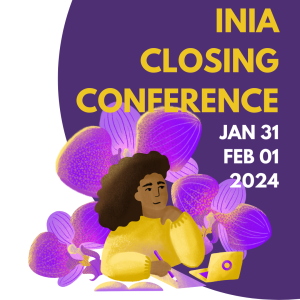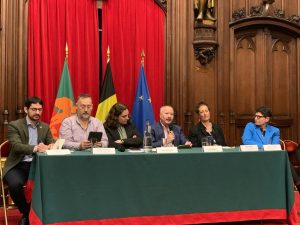INIA FINAL CONFERENCE AND STAKEHOLDER EVENT: ‘EXPANDING INTERSEX STUDIES’
Université libre de Bruxelles
Brussels, Belgium
31 January – 1 February 2024
Registration link: https://forms.office.com/e/34DXMpMKqL
Conference programme
 Background
Background
Intersex studies are an emergent field that developed in the 1990s and early 2000s. This field has changed the ways intersex people and their bodies are addressed. As such, it articulates the debate, and brings into focus issues such as rights, autonomy, subjectivity, and social movements. It insists on intersex people’s knowledge and epistemologies and questions the medical authority over intersex bodies. This growing body of literature in sciences and humanities has started a new conversation on intersex issues, arguably one directed towards a more ‘critical’ approach that goes beyond the scope of medical practices and clinical research. Critical intersex studies aim to show how the medicalization of intersex bodies and the jurisdiction of medical power classify intersex variations as ‘disorders’ and intersect with other systems of oppression, such as gender, race, class, disability and religion which restrain the rights and autonomy of intersex people. This conference aims to bring together researchers in the field of critical intersexstudies from multi- and interdisciplinary approaches to show the current state of intersex research.
For the larger part of the 20th century, intersex people have mostly only been seen and understood through medical lenses. From the ‘optimal gender policy’ to the Chicago Consensus Statement, intersex bodies have been institutionalized within the medical discipline. As research indicates, intersex people face numerous challenges and barriers throughout their lives. One of the main abuses and claims, as social movements highlight, is the unnecessary and non-consensual medical interventions aimed to ‘normalize’ their bodies and a lack of recognition of their human rights as well as stigma and discrimination. Despite this, intersex-related research has mostly focused on the medical and clinical fields, leaving other approaches behind or invisible until recently.
Conference aims
This conference brought together scholars, advocates, activists and other experts from a variety of disciplines and approaches to explore the various aspects of intersex rights recognition, including the legal, medical, social, and cultural aspects.
Topics of interest included but were not limited to:
- Intersex people’s lives, experiences, and subjectivities
- The emergence of intersex activism, advocacy and politics
- Protection of intersex human rights and the role of law and policy
- Intersex children and families
- Intersex medical treatments, consent, and interdisciplinary approaches
- The representation of intersex experiences in the media, arts, culture and religion
- Intersex inclusion in sports and education
- Intersex research and ethics
- Innovative intersex research approaches
How to register?
Here is the link to the online INIA form for the registration : https://forms.office.com/e/34DXMpMKqL
Please register early as places are limited.
Practicalities
The conference was held in person in Brussels.
Attendance was free but participants were responsible for their accommodation and transport.
The academic conference was followed by a stakeholder event on the evening of 1 February.
Welcoming words were offered by:
Marie-Colline Leroy (Secretary of State for Gender Equality, Equal Opportunities and Diversity, Belgium)
Silvan Agius (Cabinet Expert, Cabinet of the Commissioner for Equality, European Commission)
Graeme Reid (Independent Expert on protection from violence and discrimination based on sexual orientation and gender identity, United Nations) and
Lydia Mutyebele Ngoi (Aldwerwoman for Equality, City of Brussels)
Panelists at the stakeholder event included Gabriella Calleja (Senior Policy Advisor, SOGIESC Unit, Council of Europe), Surya Monro (INIA coordinator, University of Huddersfield and Loughborough University), Dan Christian Ghattas (Executive Director, OII Europe), Morgan Carpenter (Intersex Human Rights Australia) and Michael van Gelderen (Human Rights Officer, Office of the United Nations High Commissionner for Human Rights). The panel was chaired by David Paternotte (Université Libre de Bruxelles).

How to get to University Libre de Bruxelles Solbosch Campus:
https://www.ulb.be/en/solbosch/directions
